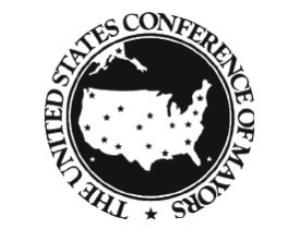The United States Conference of Mayors Monday unanimously passed a resolution criticizing the failures of marijuana prohibition and urging the federal government to respect the ability of states and localities to implement medical marijuana and marijuana legalization measures without further interference.

"In November, voters in my city and state strongly approved a ballot measure to legalize, tax and regulate marijuana," said Aurora, Colorado, Mayor Steve Hogan. "The bipartisan resolution we passed today simply asks the federal government to give us time to implement these new policies properly and without interference. Cities and states across the country are enacting forward-thinking reforms to failed marijuana prohibition policies, and for the federal government to stand in the way is wasteful and contrary to the wishes of the American people."
The resolution notes that "enforcing the costly and ineffective prohibition on marijuana drains limited resources that could be better spent on programs that more effectively serve the public and keep our cities safe from serious and violent crime" and demands that "federal laws, including the Controlled Substances Act, should be amended to explicitly allow states to set their own marijuana policies without federal interference" so that localities can "set whatever marijuana policies work best to improve the public safety and health of their communities." Until federal laws are amended, the Conference "urges the President of the United States to reexamine the priorities of federal agencies to prevent the expenditure of resources on actions that undermine the duly enacted marijuana laws of states."
The resolution was cosponsored by 18 mayors, including Bob Filner of San Diego, Mike McGinn of Seattle, Carolyn Goodman of Las Vegas, Jean Quan of Oakland (California), Steve Hogan of Aurora, Colorado; Marilyn Strickland of Tacoma, Washington; Kitty Piercy of Eugene Oregon; and William Euille of Alexandria, Virginia; among several others.
"The prohibition on marijuana has been ineffective and counterproductive," said Mayor Stephen Cassidy of San Leandro, California. "Voters in states and cities that wish to break the stranglehold of organized crime over the distribution and sale of marijuana in their communities by legalizing, regulating and taxing marijuana should have the option of doing so."
"I'm not going to be using Justice Department resources to try to circumvent state laws on this issue," Barack Obama pledged as he sought the Democratic Party nomination in 2008. But his administration has shuttered more state-legal medical marijuana providers in one term than were closed by federal authorities during the two terms of George W. Bush's presidency.
And in the wake of November's strong passage of initiatives to legalize and regulate marijuana for all adults by voters in Colorado and Washington, Attorney General Eric Holder has repeatedly said that the administration's response is coming "relatively soon."
"It's time for President Obama to enact the changes he promised during the 2008 campaign," said Tom Angell, chairman of Marijuana Majority, the organization that led the effort to pass the resolution, generating nearly 7,000 constituent letters to almost 1,000 mayors across the country. "A strong and growing majority of Americans want states to be able to set their own marijuana laws without federal harassment. Local officials are enacting policies that serve to protect the health and safety of their communities better than the failed policy of prohibition has, and they deserve the respect they are asking for from the Obama administration."
"The prohibition on marijuana has been ineffective and counterproductive," said Mayor Stephen Cassidy of San Leandro, California. "Voters in states and cities that wish to break the stranglehold of organized crime over the distribution and sale of marijuana in their communities by legalizing, regulating and taxing marijuana should have the option of doing so."
"We commend the US Conference of Mayors for taking action in defense of state and local efforts to move beyond the failed policy of marijuana prohibition. Our nation's marijuana policy should reflect the facts about marijuana. If our federal government is unwilling to adopt evidence-based marijuana laws, it is up to states and localities to pick up the slack," said Mason Tvert, lead proponent for the successful Colorado legalization initiative and now director of communications for the Marijuana Policy Project.
"Voters around the nation are increasingly becoming fed up with laws that deny seriously ill people the right to use medical marijuana and punish adults simply for using a substance that is objectively less harmful than alcohol. It is time to end marijuana prohibition and replace it with a more sensible approach," Tvert added.
This work by StoptheDrugWar.org is licensed under Creative Commons Attribution-ShareAlike 4.0 International
Comments
AG Holder says the
This seems pretty significant
I'm just getting into politics and all that kinda stuff.. so I can't be sure.. but this seems pretty significant. How much influence does the Conference of Mayors have? I mean, it can't possibly hurt the movement being supported by such a group, so I'm excited about that much, at least. I mean, these aren't just some fringe crazies, we're talking the mayors of some of America's most important "backbone" cities. This seems pretty big to me.
Change is happening from the bottom up
The people overwhelmingly support ones right to use medical marijuana and around 50 percent recreational marijuana. The patients are the ones that need it the most so that should be the first priority. Now the elected officials are starting to represent the will of the people. Starting with the majors and a few governors. That is how democracy works. States have the right to determine the medical use of marijuana and therefor it no longer meets the federal schedule I criteria of no medical use in the United States. The mayors and governors and state attorney generals should be demanding that the feds remove marijuana from federal schedule I. That is a start.
Add new comment